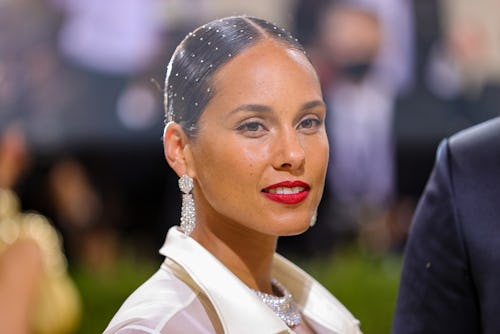Alicia Keys paused her superstardom for something way more important
Alicia Keys was on top of the world and on the verge of a breakdown in 2006.

Why would anyone slow down when they’re on top of the world? In her Marie Claire cover story, Alicia Keys recounts having a breakdown at the height of her career in fall 2006, and how she changed her life priorities afterward.
In her 2020 book More Myself, Keys candidly described breaking down into tears in her dressing room in 2006 because of “the constant pleasing and pretending.” The woman who once played on two pianos at the same time at the 61st Grammy Awards described hiding her sorrow from the public eye as her “grandest performance yet.” Keys was ascending to rarified superstardom, landing a song on the Space Jam soundtrack and releasing her hit debut album Songs in A Minor all before she was 21 years old. But the musical prodigy wanted more out of her life.
“I don’t want every single minute of every day accounted for,” she told Marie Claire. “My time is important. I want to have time with my family. I want to raise my kids. I don’t want to always be 60,000 miles away.”
To understand how transformative a change Keys made to her career, you must understand how truly ubiquitous she was by fall 2006. She released two albums — Songs in a Minor and The Diary of Alicia Keys — between 2001 and 2003; she had the biggest album from a solo R&B artist on the Billboard charts for each of the years those two albums were released; she became only the second woman artist to win five Grammy Awards in one night; revived MTV Unplugged; became a New York Times bestseller for a novel of poems and lyrics; and then won four more Grammy Awards in one night. She had been on three concert tours and even performed at the Great Wall of China. On top of all of that, she was making incontrovertibly the best R&B music of the time and already a legend in her own right.
But since the dressing room meltdown, Keys has scaled it back considerably. She went from releasing her first three albums in a little over six years to releasing her next three in nine years. She went from being on three of her own tours in four years to having three tours in the next six years, and she hasn’t toured since her Set The World On Fire Tour in 2013. She got married, had two kids, helped her longtime engineer Ann Mincieli open her own recording studio Jungle City Studios, and has moved at the path she wants her life to move. Some may point to Beyonce’s ascension to R&B queen post-2006 as Keys relinquishing her R&B queendom. But, Keys would probably tell you she gained more than she ever lost.
“I’m reaching a place where I’m much more confidently clear about the power I possess,” she told Marie Claire. “I’ve always been strong and determined. I haven’t not known my power, but now I’m clearly aware of all of it, as opposed to just pieces of it.”
Keys has always been open about her mental health, admitting to People Magazine in 2007 about dealing with bouts of depression and explaining how she “became a master of putting up the wall so that I was unreadable.” Masking her true emotions to the detriment of her own mental health wasn’t an epiphany she had when she was writing her 2020 book — it was a reality she was well aware of around the time of her Fall 2006 emotional break. Her new album Keys is set to release on December 10, and her idea of success is a lot different than it was in that dressing room in 2006.
“My most recent success is continuing to bring the family closer,” she told People in 2017. “To help us all learn how to express ourselves, our emotions and what we are going through as a family.”
Trading in superstardom for sanity is an exchange worth making. Luckily, Keys was able to achieve both on her own terms.